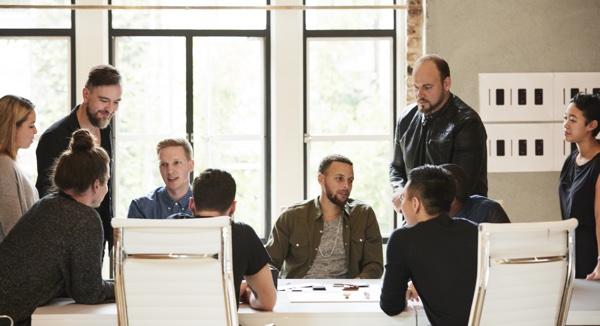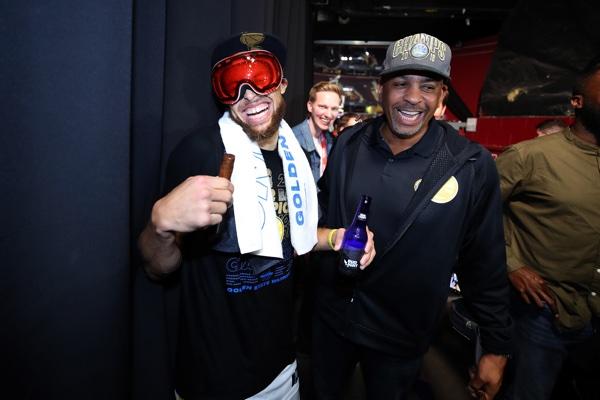It's around 11 p.m. on a Friday in New York City. Stephen Curry and the Golden State Warriors avoid a brief scare from the New York Knicks. Down three points, the Warriors outscore the Knicks 47-16 in the fourth quarter to win 128-100. Curry drops 29 points on six 3-pointers in the two-time defending champs' lone trip of the season to Manhattan.
Most of the Warriors are likely going out on the town. The squad has another game Sunday in Brooklyn against the Nets, but Curry stays late at Madison Square Garden on behalf of his partner, Palm.
No, he doesn't "have" to make this media appearance. Curry is not a paid endorser. Actually, he paid his way to make this appearance. Curry is an investor in Palm and owns the title of "creative strategy director."
"There's a lot of opportunity out there to get involved in things we're passionate about, whether that's being an investor, silent or upfront, putting your money behind something," Curry says when asked about athletes becoming entrepreneurs. "It's also important in our life and our lifestyle to share with the masses. We're all doing it our own individual ways, which is pretty exciting. We're all carving our own lanes for ourselves. But getting in on the long-term business side of things, as opposed to just that transactional relationship that it has been previously, I think that's where we're gaining a lot of leverage and power as athletes and influencers."
"Leverage" is a word here that athletes are understanding. Athletes have long been known for their endorsements, but not necessarily for their investments. In the past decade or so, thanks in part to the tech boom and social media, athletes are becoming more than just human billboards to the corporate world.
Take, for example, Bodyarmor SuperDrink. The company was started in 2011, but Kobe Bryant joined the board of directors in 2013 after purchasing a stake in the company (becoming the brand's third-largest shareholder). Bryant's addition ushered in a multitude of athlete investors including Rob Gronkowski, Richard Sherman and Skylar Diggins. Along with their investments, many athletes have provided marketing help for the brand. Just this past August, Coca-Cola acquired a minority stake in Bodyarmor.

Curry sees his opportunity with Palm, the company recently founded by Silicon Valley-based designers Dennis Miloseski and Howard Nuk. The Palm device, which takes its name from the now-defunct Palm, Inc. (the designer of PalmPilot), intends to serve as a complement to oversized smartphones. Palm can be synced to smartphones, allowing users to take the smaller device on the go, when only certain functions are necessary.
"I'm looking out here and all I see are these big devices," Curry says, triggering a laugh from the crowd. "I first envisioned how I'd use it in my own personal life, whether it's working out, being able to listen to music on the go, not having this big old thing on my body. If I'm going out to dinner, if I'm out for the night, it's a device I know is right here on my fingertips. It's out of the way and I can still be present in the social setting I'm in."
Media members want to ask Curry about his entrepreneurial life, but he can also talk about Palm like a software developer. After all, Curry has been with Palm basically from the beginning, an experience most athlete endorsers don't get to have.
"I feel super proud," Curry says. "This has obviously been a good experience for me to see something from an idea to every kind of prototype that came, from start to finish, to what we got, to them being open to suggestions and ideas from myself."
Palm is not Curry's first investment and it won't be his last. But it is one that has given him a level of influence he enjoys and feels comfortable with. Curry is self-aware. He knows he hit the jackpot becoming a star in the Bay Area, as the next generation of tech pleads for investments. It also helps that he comes from a family of athletes. His father, former NBA star Dell, wasn't on the West Coast as Bill Gates and Steve Jobs built up the personal computer market, but he had a vision for influencing the world off the court.
"North Carolina's a different scene in that respect," Curry says of watching his father as a youth. "He had an entrepreneurial mindset in terms of youth sports and things like that. It obviously benefited me and my siblings, but [also] the greater Charlotte community. It wasn't anything in the hardware or software game or the investment world, but it was that same sort of entrepreneurial mindset. If you've got access to resources, use them for positive gain, for obviously impacting the community he was in for 10 years playing and 20 years living."

Curry has hit age 30 now, and his NBA prime is still in full swing. As of Nov. 1, Curry led the NBA in scoring with 33.0 ppg. The two-time NBA MVP and three-time champion is still finding motivation on the court.
Off the court, his former Davidson teammate Bryant Barr is president of SC30, Inc., the four-employee company that handles Curry's investments. Curry is technically CEO and he's finding new connections every day.
"I would hope to say most of the guys should be able to call whoever and hopefully get a call back or connect with people, be open books and kind of point us in the right direction in terms of getting that wisdom," Curry says of how athletes interact with businesspeople. "My mentor contact list has grown by the day. Most guys don't want to get credit for it. They just want to be resources for us."
Palm will show up in 1,500 Verizon stores this November. Curry will continue to promote to strengthen his net worth. Curry encourages other athletes to do the same.
Hyped to bring @Palm back and share everything we’ve been working on since day 1! #LetsGo #LiveInTheMoment pic.twitter.com/SvVQZxJifT
— Stephen Curry (@StephenCurry30) October 15, 2018
Don't expect everyone in the Curry household to be using Palms yet though. Stephen and Ayesha run a tight tech ship with 6-year-old Riley, 3-year-old Ryan and newborn Canon.
"It's crazy to see how well-versed they are with a phone or whatever devices and swiping and all that stuff," Stephen says of Riley and Ryan. "When I was that age, I obviously had no clue, but we don't allow them to watch TV or be on the phones during the school week. We're just trying to lay that foundation, but I'm sure the hard parts will come when they get a little bit older and they start pushing back a little bit."
While promoting @palm, @StephenCurry30 explains the rules he and @ayeshacurry are making for their children:
"We don't allow them to watch TV or be on the phones during the school week...I'm sure the hard parts will come when they get a little bit older and start pushing back." pic.twitter.com/WSPNKL6yfj
— ThePostGame (@ThePostGame) October 31, 2018
That's another investment by the Currys: Keeping the tech use limited early, so the kids get connected with the outside world. Always thinking ahead.
-- Follow Jeff Eisenband on Twitter @JeffEisenband. Like Jeff Eisenband on Facebook.




